
ALGEBRA UNIVERSALIS
Scope & Guideline
Elevating Logic through Rigorous Scholarship
Introduction
Aims and Scopes
- Universal Algebra:
The journal primarily investigates universal algebra, encompassing the study of algebraic structures and their operations, providing a comprehensive framework to understand various algebraic systems. - Lattice Theory:
A significant portion of the published research delves into lattice theory, exploring properties, structures, and applications of lattices, including their role in other algebraic systems. - Algebraic Structures and Their Interactions:
The journal emphasizes the interplay between different algebraic structures, including groups, semigroups, and rings, particularly through the lens of morphisms and congruences. - Categorical Approaches:
Research often employs categorical methods to analyze algebraic structures, focusing on dualities, functors, and other categorical concepts that reveal deeper insights into algebraic relationships. - Applications of Algebraic Concepts:
The journal also covers applications of algebraic theories in various domains, such as logic, topology, and computational mathematics, demonstrating the relevance of algebra in broader mathematical contexts.
Trending and Emerging
- Advanced Lattice Structures:
There is a growing interest in advanced lattice structures, including specialized classes of lattices such as residuated lattices and MV-chains, indicating a trend towards deeper investigations into lattice properties. - Categorical Dualities:
Recent publications emphasize categorical dualities and their applications in algebra, revealing a trend towards leveraging category theory to gain insights into algebraic structures. - Algebraic Geometry Connections:
An emerging theme is the intersection of algebra and algebraic geometry, with research exploring how algebraic structures can be represented within geometric frameworks, reflecting a broader mathematical integration. - Polymorphisms and Operations:
The study of polymorphisms and their roles in algebraic operations is gaining traction, highlighting the significance of operations in understanding algebraic structures and their classifications. - Computational Algebra Techniques:
There is an increasing incorporation of computational techniques in algebraic research, suggesting a trend towards using algorithmic approaches to solve complex algebraic problems.
Declining or Waning
- Classical Group Theory:
Research related to classical group theory, particularly in the context of finite groups, has seen a decrease in the number of publications, suggesting a shift towards more abstract algebraic structures. - Basic Algebraic Structures:
Topics focusing on elementary algebraic structures, such as basic semigroups and simple ring theories, have become less prominent, indicating a move towards more complex and nuanced algebraic concepts. - Elementary Logic in Algebra:
The exploration of elementary logic as it pertains to algebraic structures is waning, possibly due to the increasing sophistication of the topics being addressed within universal algebra. - Foundational Results in Lattice Theory:
While foundational results have historically been a staple, there seems to be a decline in the publication of new foundational theories in lattice structures, as more applied and advanced topics gain attention.
Similar Journals
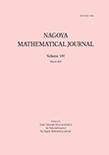
NAGOYA MATHEMATICAL JOURNAL
Elevating Mathematical Discourse Through Quality ResearchNAGOA MATHEMATICAL JOURNAL, published by Cambridge University Press, is a prestigious journal that has been at the forefront of advancing mathematical scholarship since its inception in 1950. With an ISSN of 0027-7630 and an E-ISSN of 2152-6842, this journal has gained recognition for its high-quality research contributions in the field of mathematics, achieving a Q1 classification in Mathematics (miscellaneous) as of 2023. The journal’s impact is further reflected in its Scopus rank of #164 out of 399 in the General Mathematics category, positioning it within the 59th percentile of its peers. Scholars, researchers, and students can access a range of innovative mathematical studies that explore diverse topics, fostering a vibrant dialogue within the mathematical community. By catering to a global audience, the NAGOYA MATHEMATICAL JOURNAL continues to play a critical role in shaping contemporary mathematical discourse and research.

ARS Mathematica Contemporanea
Connecting Scholars Through Open Access ResearchARS Mathematica Contemporanea, published by UP FAMNIT in Slovenia, stands as a pivotal journal within the fields of algebra, number theory, discrete mathematics, geometric topology, and theoretical computer science. Since its inception in 2011, this journal has consistently provided a rich platform for innovative research, garnering a commendable Q2 category ranking in various mathematical domains, including Algebra and Number Theory, and Geometry and Topology, showcasing its growing influence and prestige in the academic community. With an increasing Scopus rank—particularly notable in Algebra and Number Theory at the 71st percentile—ARS Mathematica Contemporanea is dedicated to publishing high-quality, peer-reviewed content that advances the frontiers of mathematical knowledge. The journal’s commitment to open access ensures that valuable research is readily available to scholars, practitioners, and students alike, fostering collaboration and dissemination of ideas across the globe. As it converges towards its dedicated timeline extending to 2024, ARS Mathematica Contemporanea remains a crucial resource for those engaged in mathematical research, presenting an array of theoretical and practical insights that define contemporary mathematical discourse.
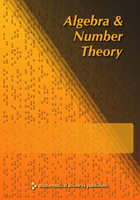
Algebra & Number Theory
Elevating Mathematical Discourse Through Rigorous ResearchAlgebra & Number Theory, published by Mathematical Science Publications, stands at the forefront of mathematical research, particularly in the fields of algebra and number theory. With an ISSN of 1937-0652 and E-ISSN 1944-7833, this esteemed journal provides a dedicated platform for the dissemination of cutting-edge theoretical advances and practical applications. It has achieved a Q1 category ranking in both algebra and number theory according to the 2023 quartiles, reinforcing its critical role in shaping contemporary mathematical discourse. The journal serves as an essential resource for researchers, professionals, and students alike, offering insights into diverse mathematical methodologies and fostering open dialogue among scholars. Although it does not provide open access, its robust impact factor reflects the high quality and relevance of its published work. Based in the United States at the University of California, Berkeley, the journal's commitment to excellence continues to attract contributions that push the boundaries of mathematical understanding.

Forum of Mathematics Sigma
Pioneering discoveries in algebra, analysis, and beyond.Forum of Mathematics Sigma is a premier open access journal published by Cambridge University Press that has been at the forefront of mathematical research since its inception in 2013. With a strong emphasis on advancing the fields of mathematics, the journal consistently achieves Q1 rankings across multiple categories, including Algebra and Number Theory, Analysis, and Computational Mathematics. This distinction highlights its impact and relevance within the scholarly community. The journal prides itself on providing a platform for innovative research, fostering collaboration among researchers and practitioners across various mathematical disciplines. Open access publication ensures that cutting-edge findings are widely available to readers globally, enhancing the dissemination of knowledge. With an address in the heart of Cambridge, England, Forum of Mathematics Sigma is dedicated to promoting high-quality research and making significant contributions to the development of mathematics.
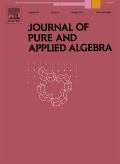
JOURNAL OF PURE AND APPLIED ALGEBRA
Exploring the Depths of Pure and Applied MathematicsJOURNAL OF PURE AND APPLIED ALGEBRA, published by Elsevier, stands as a premier academic platform in the fields of algebra and number theory, boasting a distinguished impact factor that reflects its rigorous peer-review process and influential research contributions. Established in 1971 and continuing its impressive trajectory until 2025, this journal has carved a niche for itself by providing a forum for innovative studies, theoretical advancements, and practical applications within pure and applied algebra. With its prestigious Q1 ranking in Algebra and Number Theory, the journal not only ranks among the top tier in its category but also offers an extensive collection of research that caters to mathematicians, academicians, and students alike. Scholars will find it an invaluable resource for disseminating their findings, as well as keeping abreast of significant developments in the field, further solidifying its role as a cornerstone of mathematical research.
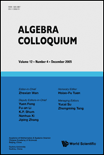
ALGEBRA COLLOQUIUM
Exploring the Depths of Algebra and Number TheoryALGEBRA COLLOQUIUM is a prominent journal dedicated to advancing the field of mathematics, specifically focusing on Algebra and Number Theory as well as Applied Mathematics. Published by World Scientific Publishing Co Pte Ltd, this journal is based in Singapore and has been a cornerstone in mathematical research since its inception in 1996, with an anticipated convergence through 2024. With an ISSN of 1005-3867 and E-ISSN of 0219-1733, it features rigorous peer-reviewed papers that cover a diverse range of topics within its scope. Reflecting its quality, Algebra Colloquium is ranked in the Q3 quartile in both Algebra and Number Theory as well as Applied Mathematics, indicating its significance amidst a competitive publication landscape. Researchers, professionals, and students looking to stay at the forefront of mathematical innovation will find a wealth of knowledge and research insights within these pages, making it an essential resource for anyone committed to deepening their understanding of algebraic concepts and techniques.

JOURNAL OF THE AMERICAN MATHEMATICAL SOCIETY
Fostering Insightful Discourse in Mathematical SciencesThe Journal of the American Mathematical Society (ISSN: 0894-0347; E-ISSN: 1088-6834), published by the American Mathematical Society, stands as a pillar in the fields of mathematics and applied mathematics. This prestigious journal, with a remarkable impact factor and ranking in the top tier (*Q1*) within both the Applied Mathematics and general Mathematics categories, is recognized for its contribution to advancing mathematical research and theory. With data reflecting it as the 8th ranked journal in General Mathematics (top 2%) and the 34th in Applied Mathematics (top 6%), the journal consistently showcases groundbreaking studies and innovative methods that greatly influence academia and industry alike. Though not an open-access journal, it offers a wealth of resources and intellectual discourse for researchers, professionals, and students alike. Specializing in comprehensive and theoretical aspects of mathematics, the Journal remains dedicated to publishing articles that promote understanding and propel the field forward, highlighting its significance as an essential tool for those engaged in mathematical research.

Journal of Combinatorial Algebra
Advancing the Frontiers of Algebra and CombinatoricsThe Journal of Combinatorial Algebra, published by the European Mathematical Society (EMS), is a pioneering open-access journal dedicated to advancing research in the fields of Algebra and Number Theory, as well as Discrete Mathematics and Combinatorics. Since its inception in 2018, the journal has been committed to promoting high-quality, rigorous research, evidenced by its 2023 scopus rankings placing it in the second quartile across both disciplines. It serves as a vital platform for academics, researchers, and students to share innovative findings, methodologies, and theoretical advancements within combinatorial algebra, facilitating collaboration and knowledge dissemination in the mathematical community. With its open access policy adopted in 2021, the journal ensures that its content is freely available to a global audience, further enriching the landscape of mathematical research. The journal's editorial board, composed of leading experts, guarantees the integrity and academic excellence of published articles, making it an essential resource for those engaged in the dynamic fields of combinatorics and algebra.

JP Journal of Algebra Number Theory and Applications
Connecting Concepts: Algebra Meets Number TheoryJP Journal of Algebra Number Theory and Applications is a distinguished publication within the field of mathematics, specifically focusing on algebra and number theory. Published by PUSHPA PUBLISHING HOUSE, this journal serves as a platform for researchers and professionals to disseminate their cutting-edge findings and innovative methodologies. With its ISSN 0972-5555, it caters to an audience eager to explore mathematical concepts and applications that impact various scientific domains. Although it operates on a subscription model, the journal's commitment to high-quality peer-reviewed content makes it a valuable resource for students and scholars alike. The journal offers an exclusive insight into the complex interplay between algebra and number theory, ensuring that it remains at the forefront of mathematical discourse despite its coverage discontinuation from Scopus. The absence of an H-Index and low rankings within Scopus underscore the challenges the journal faces in a competitive academic landscape; however, it continues to foster a community for the exchange of ideas and the advancement of knowledge in mathematics.
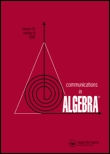
COMMUNICATIONS IN ALGEBRA
Pioneering Discoveries in Algebraic Research.COMMUNICATIONS IN ALGEBRA is a prestigious academic journal dedicated to advancing the field of algebra and number theory. Published by Taylor & Francis Inc, this influential journal has been in circulation since its inception in 1974 and continues to provide a platform for innovative research through 2024. With an ISSN of 0092-7872 and an E-ISSN of 1532-4125, it serves a global community of researchers, professionals, and students who are passionate about algebraic studies. The journal is currently ranked in the Q2 category in Algebra and Number Theory for 2023, showcasing its strong impact and relevance within the academic community, as reflected in its Scopus rank of #60 out of 119 and a 50th percentile standing. COMMUNICATIONS IN ALGEBRA aims to publish high-quality, peer-reviewed research articles that not only address current issues in the field but also pave the way for future exploration, solidifying its role as a cornerstone of mathematical literature.